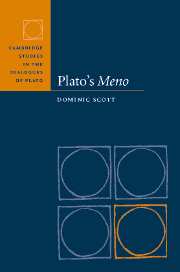Book contents
- Frontmatter
- Contents
- Acknowledgements
- Introduction
- Part I
- Chapter 1 The opening: 70a–71d
- Chapter 2 The first definition: 71e–73c
- Chapter 3 A lesson in definition: 73c–77b
- Chapter 4 The third definition: 77b–79e
- Chapter 5 Meno as an interlocutor
- Part II
- Part III
- Conclusion
- Appendices
- References
- Index of ancient passages
- General index
Chapter 3 - A lesson in definition: 73c–77b
Published online by Cambridge University Press: 29 September 2009
- Frontmatter
- Contents
- Acknowledgements
- Introduction
- Part I
- Chapter 1 The opening: 70a–71d
- Chapter 2 The first definition: 71e–73c
- Chapter 3 A lesson in definition: 73c–77b
- Chapter 4 The third definition: 77b–79e
- Chapter 5 Meno as an interlocutor
- Part II
- Part III
- Conclusion
- Appendices
- References
- Index of ancient passages
- General index
Summary
THE SECOND DEFINITION
Meno's second definition of virtue comes at 73c9–d1: ‘what else, but the power to rule over people, if you are looking for one definition to cover all cases?’ The discussion of this definition is very brief. Although Meno claims it satisfies the unitarian assumption, Socrates immediately points out that it does not apply to children or slaves. He then asks whether they should not add the power to rule with justice. Meno agrees, on the grounds that justice is virtue. ‘Virtue or a virtue?’ Socrates asks. Meno does not appear to understand; but after being given a parallel, quickly agrees that there are other virtues: for example, courage, temperance, magnificence (megaloprepeia), wisdom and many more besides. Now, however, they are back where they started, with a swarm of virtues and still no common characteristic. When Meno professes himself unable to find this characteristic, Socrates feels compelled to explain at some length what it means to ask for a definition.
In this brief passage, Socrates entirely demolishes Meno's second definition. In the process of doing so, he points towards an account of virtue as a genus with a wide range of species. This will come to the fore in the discussion of the third definition. Another striking feature is the way Meno appears to have forgotten the lessons of the previous discussion so quickly. We shall consider the implications of this when we discuss his character as an interlocutor on pages 60–5 below.
- Type
- Chapter
- Information
- Plato's Meno , pp. 31 - 45Publisher: Cambridge University PressPrint publication year: 2006



